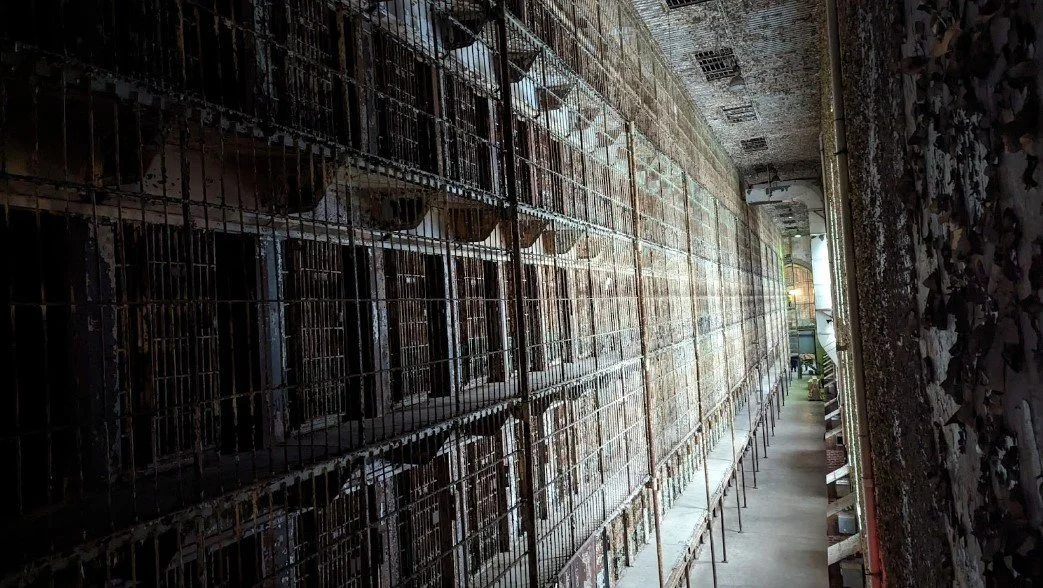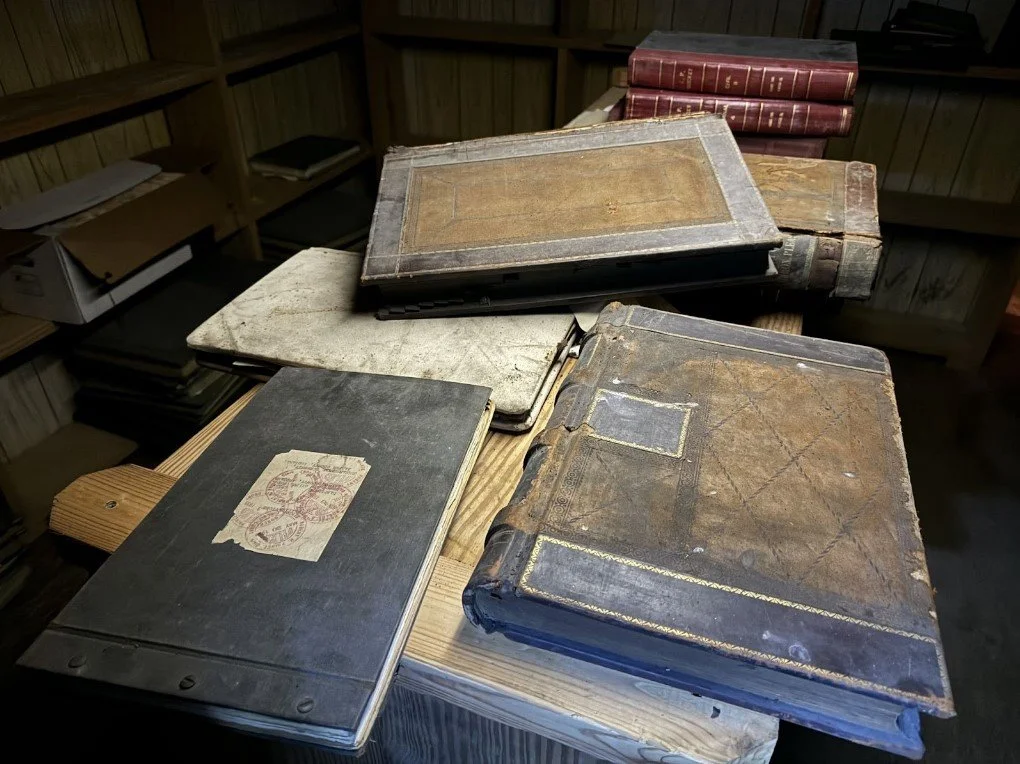Paranormal Ethics:
Why Standards Matter in the Unknown
At its core, the paranormal is about exploring the unknown. But the unknown doesn’t exist in a vacuum—it intersects with real people, real histories, and real emotions. When investigators act without ethics, they risk not only harming individuals but also undermining the entire field.
Here at the Spooky Sisterhood, we believe that by working together, we can create a framework based around kindness and respect, to help hold each other accountable and make strides in making new discoveries in the paranormal. Below is a list of suggested practices that we believe shows honesty and integrity in a field that can get murky at times.
Randolph County Infirmary, Winchester IN (Photo by: Bri Barger)
Why Ethics Are Essential in the Paranormal
Unlike medicine, journalism, or science, the paranormal world currently lacks widely accepted, formal governing bodies. There are no universally accepted boards that regulate ghost hunters, psychics, or investigators, which means it's up to the individual to move with integrity and respect. This lack of structure can make the field a breeding ground for misinformation, manipulation, or even trauma. Ethical guidelines provide a compass to keep our work honest, respectful, and constructive.
Thomas House Hotel, Red Boiling Springs TN (Photo by: Bri Barger)
Protecting the Living
Investigations often take place in private homes, abandoned buildings, public spaces, or community landmarks. The people who are associated with these spaces may already feel frightened, vulnerable, or desperate for answers, depending on the activity they are experiencing, and if they live there. An investigator’s role should never be to heighten fear or exploit emotions. Clear communication, consent, and respect for privacy are paramount. This is key not only for the safety of the living, but for the owners of the space in which you are moving, as well as to make sure others can safely and legally investigate the space you are in.
Investigators must handle each situation with sensitivity. That means explaining methods clearly, setting realistic expectations, and never heightening fear for dramatic effect. If you are working with a client, they are already in a heightened state of vulnerability (most people don’t want to call in paranormal investigators unless they’ve EXHAUSTED every other possibility), your words and actions carry enormous weight, the impression you make will stay with the people involved, and can have wide-spread impact on how others are viewed and approached.
Respecting the Dead
Whether or not one believes in spirits, cemeteries, historical sites, and alleged haunted objects and locations deserve reverence because of their history. Staging sensational stunts or provoking in the name of entertainment can feel deeply disrespectful—not only to the deceased but also to families and communities tied to those places. Behaving this way for social media can risk coming off like exploitation more than investigation. If we believe we are communicating with the dead or some being greater than ourselves, basic human dignity applies; if we don’t, then we should at least respect the cultural and emotional significance of the space’s history and its importance to the living. The dead may not complain, but their descendants and communities certainly can. We have an obligation to enter and behave in spaces with integrity and respect. Besides, when dealing with some unseen force that can manipulate objects, do you really want to risk provoking them? I don’t.
Peoria State Hospital Cemetery #3, Peoria IL (Photo by: Andronike James)
Preserving Integrity
Without standards, the paranormal field risks being dismissed as pure entertainment or, worse, a scam. Establishing ethical practices—such as honest evidence review, transparency about methods, and refusal to falsify results—helps strengthen our credibility as individual investigators, and as a community. Even skeptics are more likely to listen when investigators show up responsibly.
Ohio State Reformatory, Mansfield OH (Photo by: Bri Barger)
Key Principles for Paranormal Standards
Informed Consent – Always seek permission before entering private property or recording.
Honesty – Never exaggerate or fabricate evidence for attention or profit.
Verify your evidence – Don’t assume everything is paranormal. If you can explain it scientifically, do it, even if it’s at a later date. This adds credence to the evidence you can’t explain.
Research – Read historical documents, enlist your favorite librarian, give the folks at the historical society a challenge, and verify your sources. Accuracy and truth matter when credibility is at stake. Myths and legends are great, especially when looking for the next mystery to investigate, but it’s paramount to keep fact and fiction separate.
Respect – Whether investigating a home or a historical site, treat clients, objects, and locations with dignity.
Confidentiality – Protect sensitive information. Many families don’t want their experiences broadcast publicly. Make sure you have express permission to divulge or publish other’s personal information.
Non-Exploitation – Avoid financial or emotional manipulation of clients who may be grieving, fearful, or searching for closure.
Admit Your Mistakes – We all make mistakes. Admitting when you got things wrong and taking responsibility for it respectfully, and without placing blame on others, strengthens your integrity as a researcher, and the validity of your evidence.
Safety First – Prioritize physical safety during investigations (structurally unsafe buildings, electrical hazards, or trespassing can turn a ghost hunt into an ER visit… or a police record).
Disagree Respectfully – Don’t tarnish your own reputation and experience by throwing shade at others. We all have different reasons and motivations for being involved in the paranormal. Whether we are content creators, psychic mediums, paranormal investigators – we are all here to explore and document the unknown. Keep the community safe, and we all grow together.
Have Fun and Stay Curious!
Old Fowler County Jail, Fowler IN (Photo by: Andronike James)
Why Standards Matter
Standards don’t stifle mystery; they elevate it. They allow paranormal research to move forward in a way that’s credible, respectful, and sustainable. After all, the search for answers should bring more light than darkness.
Fascination with the paranormal can be more than just cryptids and ghost hunting - it could also be begging for scary tales and folklore around the campfire, exploring Tarot, browsing Facebook Marketplace for haunted objects, or watching the night sky for UFOs. Humans have always been enthralled by the things we don't understand. After all, "curiosity killed the cat," but don't forget that "satisfaction brought it back." Although great strides have been made in technological advancement and understanding in other sciences, the paranormal is still vastly misunderstood and unknown. Due to bias from the rest of the academic community, there are no broadly recognized ethical practices or standards, nor organized peer review processes for paranormal investigators to reference or cross check each other.
Written by: Andronike James and Bri Barger





